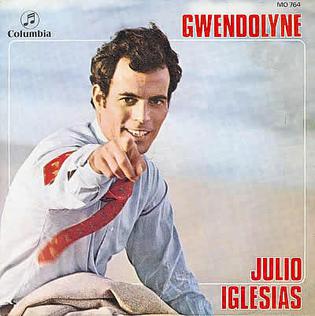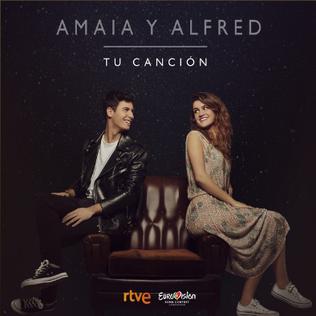The Benidorm International Song Festival, until 2004 simply Benidorm Song Festival, was an annual song contest held in the city of Benidorm, Spain. The contest, based on the Italian Sanremo Music Festival, was created to promote Benidorm and Spanish music.
Spain participated in the Eurovision Song Contest 2005 with the song "Brujería" written by Alfredo Panebianco. The song was performed by the group Son de Sol. The Spanish broadcaster Televisión Española (TVE) organised the national final Eurovisión 2005: Elige nuestra canción in order to select the Spanish entry for the 2005 contest in Kyiv, Ukraine. The national final consisted of a semi-final and a final and involved twelve artists and songs. Six entries ultimately qualified to compete in the televised final where a public televote exclusively selected "Brujería" performed by Son de Sol as the winner, receiving 24.2% of the votes.
Spain participated in the Eurovision Song Contest 2007 with the song "I Love You Mi Vida" written by Thomas G:son, Andreas Rickstrand, Tony Sánchez-Ohlsson, Rebeca Pous Del Toro. The song was performed by the group D'Nash. The Spanish broadcaster Televisión Española (TVE) organised the national final Misión Eurovisión 2007 in order to select the Spanish entry for the 2007 contest in Helsinki, Finland. The national final consisted of four heats, a semi-final and a final and involved 57 competing acts. Five acts and five songs ultimately qualified to compete in the televised final where a public televote first selected the top five to advance to the second round. In the second round of voting, a regional televote exclusively selected "I Love You Mi Vida" performed by Nash as the winner. The group was later renamed as D'Nash for the Eurovision Song Contest.
Spain participated in the Eurovision Song Contest 2009 with the song "La noche es para mí" written by Irini Michas, Dimitri Stassos, Jason Gill and Felipe Pedroso. The song was performed by Soraya. The Spanish broadcaster Televisión Española (TVE) organised the national final Eurovisión 2009: El retorno in order to select the Spanish entry for the 2009 contest in Moscow, Russia. The national final consisted of three semi-finals and a final and involved 30 artists and songs. Ten entries ultimately qualified to compete in the televised final where an in-studio jury and a public televote selected "La noche es para mí" performed by Soraya as the winner.

"Gwendolyne", sometimes spelt "Gwendoline", is a song composed and recorded by Spanish singer Julio Iglesias, co-written by Leo Johns. It is best known as the Spanish entry at the Eurovision Song Contest 1970, held in Amsterdam.
Spain participated in the Eurovision Song Contest 2010 with the song "Algo pequeñito" written by Jesús Cañadilla, Luis Miguel de la Varga, Alberto Jodar and Daniel Diges. The song was performed by Daniel Diges. The Spanish broadcaster Televisión Española (TVE) organised the national final Destino Oslo, La Gala de Eurovisión 2010 in order to select the Spanish entry for the 2010 contest in Oslo, Norway. Ten artists and songs selected through an Internet public vote competed in the televised show where an in-studio jury and a public televote selected "Algo pequeñito" performed by Daniel Diges as the winner.
Spain took part in the Eurovision Song Contest for the first time in 1961. The country was represented by Conchita Bautista with the song "Estando contigo", written by Antonio Guijarro and Augusto Algueró. The song was chosen through a national final.
Spain participated in the Eurovision Song Contest 2011 with the song "Que me quiten lo bailao" written by Rafael Artesero. The song was performed by Lucía Pérez. The Spanish broadcaster Televisión Española (TVE) organised the national final Destino Eurovisión in order to select the Spanish entry for the 2011 contest in Düsseldorf, Germany. The national final consisted of two heats, a semi-final and a final and involved 24 competing acts. Three acts and nine songs ultimately qualified to compete in the televised final where an in-studio jury first selected one song per act to advance to the second round. In the second round of voting, a public televote exclusively selected "Que me quiten lo bailao" performed by Lucía Pérez as the winner.
Spain participated in the Eurovision Song Contest 2012 with the song "Quédate conmigo" written by Thomas G:son, Tony Sánchez-Ohlsson and Erik Bernholm. The song was performed by Pastora Soler, who was internally selected by the Spanish broadcaster Televisión Española (TVE) in December 2011 to represent Spain at the 2012 contest in Baku, Azerbaijan. The national final Eurovisión: Pastora Soler was organised in order to select the song Soler would perform. Three songs, one selected through an Internet public vote, competed in the televised show where an in-studio jury and a public televote selected "Quédate conmigo" as the winning song.
Spain participated in the Eurovision Song Contest 2013 with the song "Contigo hasta el final" written by Raquel del Rosario, David Feito and Juan Luis Suárez. The song was performed by the band ESDM, which was internally selected by the Spanish broadcaster Televisión Española (TVE) to represent Spain at the 2013 contest in Malmö, Sweden. ESDM was announced as the Spanish representative on 17 December 2012, while the national final El Sueño de Morfeo: Destino Eurovisión was organised in order to select the song ESDM would perform. Three songs, one selected through an Internet public vote, competed in the televised show where an in-studio jury and a public televote selected "Contigo hasta el final" as the winning song.
Spain participated in the Eurovision Song Contest 2014 with the song "Dancing in the Rain" written by Ruth Lorenzo, Jim Irvin and Julian Emery. The song was performed by Ruth Lorenzo. The Spanish broadcaster Televisión Española (TVE) organised the national final Mira quién va a Eurovisión in order to select the Spanish entry for the 2014 contest in Copenhagen, Denmark. Five artists and songs competed in the televised show where an in-studio jury and a public televote selected "Dancing in the Rain" performed by Ruth Lorenzo as the winner.
Spain participated in the Eurovision Song Contest 2015 with the song "Amanecer" written by Tony Sánchez-Ohlsson, Peter Boström and Thomas G:son. The song was performed by Edurne, who was selected by Spanish broadcaster Televisión Española (TVE) to represent the nation at the 2015 contest in Vienna, Austria. Edurne was announced as the Spanish representative on 14 January 2015, while "Amanecer" were presented to the public as the Spanish entry on 1 March 2015.
Spain participated in the Eurovision Song Contest 2016 with the song "Say Yay!" written by Bárbara Reyzábal, Rubén Villanueva and Víctor Púa Vivó. The song was performed by Barei. The Spanish broadcaster Televisión Española (TVE) organised the national final Objetivo Eurovisión in order to select the Spanish entry for the 2016 contest in Stockholm, Sweden. Six artists and songs competed in the televised show where an in-studio jury, an international jury and a public televote selected "Say Yay!" performed by Barei as the winner.
Spain participated in the Eurovision Song Contest 2017 with the song "Do It for Your Lover" written by Manel Navarro and Antonio Rayo "Rayito". The song was performed by Manel Navarro. The Spanish broadcaster Televisión Española (TVE) organised the national final Objetivo Eurovisión 2017 in order to select the Spanish entry for the 2017 contest in Kyiv, Ukraine. Six artists and songs, one of which was selected through the wildcard round Eurocasting, competed in the televised show where an in-studio jury and a public vote selected "Do It for Your Lover" performed by Manel Navarro as the winner.
Spain participated in the Eurovision Song Contest 2018 with the song "Tu canción", written by Raúl Gómez and Sylvia Santoro. The song was performed by Amaia Romero and Alfred García. The Spanish broadcaster Televisión Española (TVE) used the ninth series of reality television talent competition Operación Triunfo as the platform to select the Spanish entry for the 2018 contest in Lisbon, Portugal. Amaia and Alfred with "Tu canción" were selected by the vote of the Spanish public from among nine competing entries.

"Tu canción" is a song performed by Spanish singers Amaia Romero and Alfred García, and written by Raúl Gómez and Sylvia Santoro. The performing duo is identified and credited as Amaia y Alfred. The song was released as a digital download on 28 January 2018 through Universal Music Spain. It represented Spain in the Eurovision Song Contest 2018 in Lisbon, Portugal. It finished in twenty-third place.
Spain participated in the Eurovision Song Contest 2019 with the song "La venda", performed by Miki and written by Adrià Salas. The Spanish broadcaster Televisión Española (TVE) used the tenth series of reality television talent competition Operación Triunfo as the platform to select the Spanish entry for the 2019 contest in Tel Aviv, Israel.

"La venda" is a song performed by Spanish singer Miki and written by Adrià Salas, who is the lead vocalist of the Latin Grammy-nominated band La Pegatina. The song represented Spain in the Eurovision Song Contest 2019 in Tel Aviv. It finished in 22nd place with 54 points.
Spain participated in the Eurovision Song Contest 2021 with the song "Voy a quedarme" written by Blas Cantó, Leroy Sanchez, Daniel Ortega "Dangelo" and Dan Hammond. The song was performed by Blas Cantó, who was internally selected by the Spanish broadcaster Televisión Española (TVE) to represent Spain at the 2021 contest in Rotterdam, Netherlands after he was due to compete in the 2020 contest with "Universo" before the event's cancellation. Blas Cantó was announced as the Spanish representative on 18 March 2020, while the national final Destino Eurovisión 2021 was organised in order to select the song Cantó would perform. Two songs competed in the televised show where a public vote exclusively selected "Voy a quedarme" as the winning song, receiving 58% of the votes.
Spain is scheduled to participate in the Eurovision Song Contest 2022 in Turin, Italy, with the song "SloMo" performed by Chanel. The Spanish broadcaster Radiotelevisión Española (RTVE) organised Benidorm Fest in order to select the Spanish entry for the 2022 contest. Benidorm Fest consisted of two semi-finals on 26 and 27 January and the final on 29 January 2022. A total of thirteen artists and songs competed, and the winner was determined by a combination of votes from an expert jury, a demoscopic panel and a televote.


